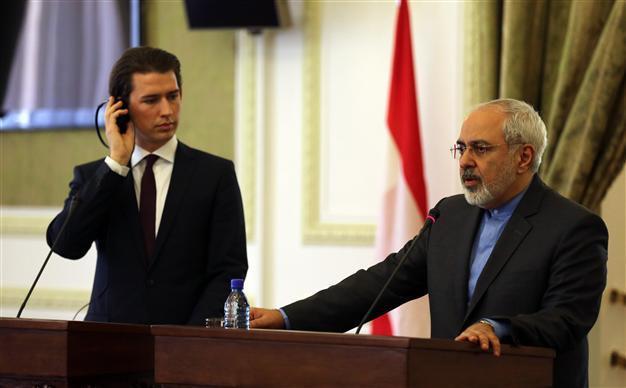Iran FM says people would support fair nuclear deal
TEHRAN - Agence France-Presse

Iranian Foreign Minister Mohammad Javad Zarif (R) speaks as his Austrian counterpartSebastian Kurz (L) listens during a joint press conference in Tehran, on April 27, 2014. AFP Photo
Foreign Minister Mohammad Javad Zarif said Sunday that the majority of Iranians would support a comprehensive nuclear deal that "respects Iran's rights and the demands of the people."
"That would be the only agreement that myself and President (Hassan) Rouhani will agree (to)," Zarif said during a joint news conference in Tehran with his Austrian counterpart Sebastian Kurz.
When asked whether hardliners could derail the nuclear talks, Zarif said: " Iran is not a monolith ... we will have those who will not favour an agreement, but at the end of the day what will count is the view of the majority of the Iranian people."
In November, Iran clinched a deal with world powers under which it froze some nuclear activities in return for limited relief from crippling international sanctions.
Tehran has been engaged in negotiations with the P5+1 -- Britain, China, France, Russia and the United States, plus Germany -- aimed at reaching a lasting accord on its nuclear ambitions.
Western nations and Israel have long suspected Iran of pursuing a nuclear weapons capability alongside its civilian programme, charges denied by Tehran.
Any final deal with the West may involve Iran slashing its number of centrifuges, changing the design of a new reactor at Arak and giving UN inspectors more oversight.
Rouhani's administration has, however, already come under fire from hardliners who say the negotiators have conceded too much.
At the news conference Zarif also rejected as "baseless" claims that Iran's ballistic missiles with a range of 2000 kilometres could carry nuclear warheads.
He said Iranian defence capabilities would not be discussed at the nuclear talks and reiterated that nuclear weapons contradicted Islamic teachings.
Kurz, meanwhile, said a comprehensive deal would help stabilise the region.
"One should avoid losing this opportunity, because this solution in regards with nuclear talks will lead to stability and security of the whole region ... and it will be helpful (from) the economic viewpoint for the Iranian people," Kurz said.
He said he raised the issue of human rights with Zarif.
"I voiced my concerns about the situation of the human rights ... we reject capital punishment," Kurz added.
According to the United Nations, more than 170 people have been executed in Iran since the beginning of 2014.
UN chief Ban Ki-moon in March voiced alarm over the high number of hangings in Iran, saying at least 500 people had been executed last year, including 57 in public.
